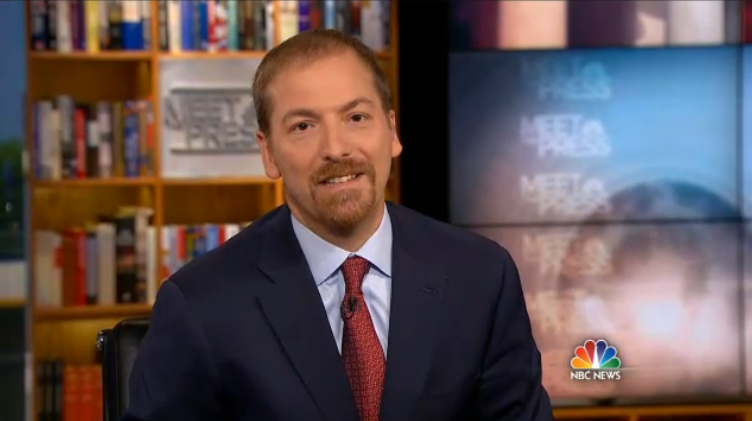Can Hillary Clinton’s presumed 2016 frontrunner status be reduced to her chromosomes? That view seems to have penetrated the D.C. punditocracy, as relayed by NBC’s newly christened “Meet The Press” moderator Chuck Todd on Monday.
Todd said in an interview on the Charlie Rose Show that the former secretary of state and U.S. senator would not be the prohibitive favorite “if she were running to be the second woman president.”
“If she were running to be the second woman president, I think she would not even be considered a frontrunner,” he said, according to a transcript provided to TPM. “She’d be just considered another candidate.”
Rose and Todd referenced the “historical narrative” that Clinton would have in 2016 — one that wasn’t as prevalent in 2008, when she was running against another historical candidate in Barack Obama. “This time hers seems that kind of powerful,” Todd said. “It does feel that powerful.”
But have we really come so far that being the “first woman” bestows enormous electoral advantages? Clinton in 2008 was by far the most formidable female presidential candidate in U.S. history — and she didn’t even win the nomination. The others are limited to also-rans like Michele Bachmann in 2012 and Carol Moseley Braun in 2004. Certainly, there will be some voters motivated at least in part by the opportunity to “break that glass ceiling,” as Todd put it later. But is that all that’s happening here?
Jennifer Lawless, a political scientist at American University, isn’t buying it. Research has shown, she said, that female candidates fare no worse — and no better! — than male candidates in lower-office elections, after accounting for other factors like incumbency.
“Hillary Clinton is the front-runner not because she’s a woman, but because she has the background and experience that she has,” Lawless told TPM. She has a political network and fundraising connections built after decades in politics — not to mention historic levels of name recognition, the most important factor in the early stages of a not-yet-existent campaign.
“We have to look back no further than 2008 to see that the glass-ceiling factor alone isn’t sufficient,” Lawless said.
Clinton’s resume — U.S. senator, secretary of state and prominent White House adviser (to de-gender her time as First Lady) — would historically be enough to put her in the top tier of presidential candidates heading into 2016 regardless of gender, James Hilty, a presidential historian at Temple University, told TPM.
As he put it: “If she were male, you wouldn’t be asking the question.”
Hilty contrasted Clinton with Geraldine Ferraro and Sarah Palin, vice presidential nominees who lacked national profiles and didn’t have Clinton’s resume when they were selected.
“It all boils down to competency. You can’t win on gender alone,” he said. “She’s not the female candidate. There’s a lot of competition for that now, which is good, which is leaning in the direction of making gender a fairly neutral issue.”
Todd’s larger point was that the power of Clinton’s appeal as potentially the first woman president helps her overcome that she is, in his words, “kind of out of step of where the Democratic Party is going to be in 2016.” Todd pointed to her more hawkish foreign policy and perceived coziness with the business community. Of course, that other piece of conventional wisdom — “Hillary has a liberal problem” — has already been called into question by writers like Slate’s Dave Weigel.
But even with his assessment of the Democratic base, Todd theorized that they would still be enthusiastic about supporting Clinton and offered his rationale.
“I think the enthusiasm to break that glass ceiling may allow her to overcome those other issues,” he said.
Is it really so simple? It can be somewhat difficult to “isolate” gender as an issue and measure its effect on primary and general voters, Temple’s Hilty acknowledge. He threw out the hypothetical Clinton versus Sen. Elizabeth Warren (D-MA) as one scenario in which gender would be completely “neutralized.” Lawless also referenced past situations — such as when vulnerable Democrat Sen. Claire McCaskill seized on Todd Akin’s comments on “legitimate rape” and won an unlikely re-election in 2012 — where gender likely did play some role in the outcome of a race.
But Hilty and Lawless aren’t seeing that in 2016. In fact, Lawless said, Clinton’s election likely wouldn’t tell us anything about gender in politics. No woman who runs after her would have any of the built-in, gender-neutral advantages that Clinton has going into 2016 — even if the glass ceiling has been broken.
“We can’t generalize based on one race ever,” she said. “But Hillary Clinton in particular is a terrible case to try and draw generalizations from because no other candidate, male or female, will have the backgrounds and exposure that she’s had. And it’s really difficult to parcel out the independent effect of sex versus everything else.”







Well, Chuck Todd is showing his colors already (Take that, you Daily Beast posters who call Chuck a “liberal-lover.”)
Another stupid question posed for debate by an air head.
Resolved: HRC is called the “front runner for the next POTUS” only because she’s a female.
“Now let’s hear from our dumb-ass panelists. By a toss of the coin, you, Sarah Palin, go first”.
Because, of course, once the novelty of having a female candidate for President has run its course, having the credentials of being a former Secretary of State, First Lady, member of the board of WalMart, and among the progenitors of Democrat “Third Way” politics is irrelevant to those who make the decisions about who we may vote for.
And someone at NBC thinks this man is competent.
nonsense. hillary is front-runner cause neocons can live with her.
Is is just me or does Chuck Todd look like he has been hitting the Crack-Pipe pretty hard lately?
How else to explain the sudden weight-loss and jittery-red-eyes?